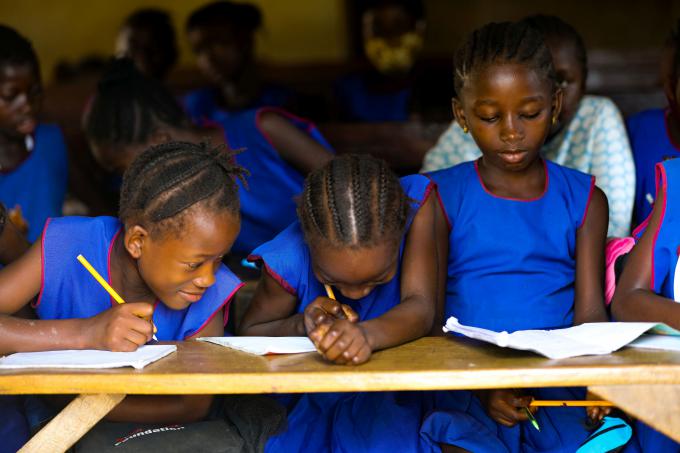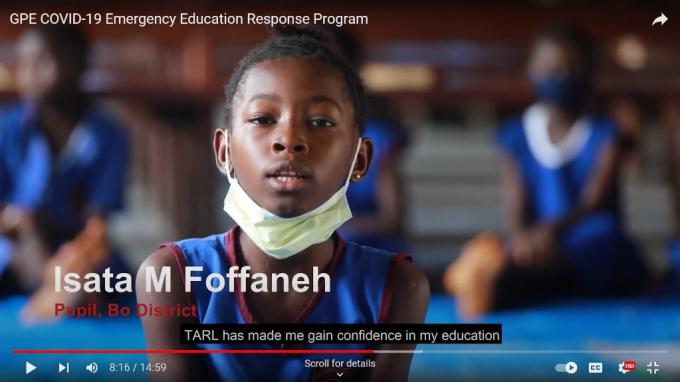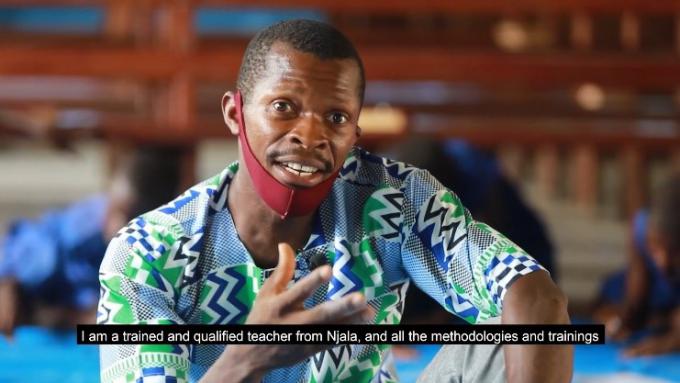GPE NGO Consortium improves literacy for sixty percent of children in Sierra Leone through accelerated learning post COVID-19
Written by Kalako Mondiwa & Kelfa Kargbo[1]
[1] Kalako Mondiwa is the Chief of Party for the NGO Consortium, Kelfa Kargbo is the Executive Director for Street Child of Sierra Leone, a member of the NGO Consortium

Girls working together in class, 2021. Photo by Save the Children
Despite efforts by the Government of Sierra Leone (GoSL), education outcomes for many children have been low. While enrolment rates have increased[1] with the introduction of Free Quality School Education (FQSE) in 2018, literacy and numeracy outcomes have only marginally improved for many reasons. A recent survey[2] by the Ministry of Basic, and Senior Secondary Education (MBSSE) for instance found that up to 66% of children in grade 4 cannot read a single word. They also found that 70% of learners cannot read to comprehend simple sentences; 67% of learners cannot to do addition while 77% cannot do simple subtraction. While these results show a minute improvement from previous years, the findings are consistent with previous studies that found that over 80% of grade 4 students did not know a single letter in English let alone read a passage for understanding and answer related comprehension questions. One of the key factors contributing to these low learning outcomes is the lack of adequate trained and qualified teachers with skills to deliver child centered literacy and numeracy instruction. In 2020, when schools closed in Sierra Leone due to the COVID-19 pandemic, many children were unable to access learning opportunities and as such experienced learning losses. In fact, teachers and community volunteers did not have the adequate skills and resources required to be able to continuously deliver quality education, before. during and after school closures[3].
To mitigate against these learning losses, the Ministry of Basic and Senior Secondary Education (MBSSE) and education partners developed the COVID 19 Education Emergency Response Plan. With funding from Global Partnership for Education (GPE) through the World Bank plus other development partners including UNICEF, the MBSSE delivered and expanded its distance learning program. The MBSSE ensure that children are able to use existing recorded lessons and tailored support for struggling children to enable catch-up learning outside of school hours. This provided continuation of learning for those children unable to return to school or temporarily excluded due to quarantine. However, despite the excellent work of the MBSSE in rolling out the radio teaching programme, the reality was that many disadvantaged children especially in remote and marginalized communities were not accessing the programming. To address this challenge MBSS invited the NGO consortium to deliver accelerated learning in most remote schools. Working with Pillar Leads of the Emergency Education Taskforce, including the MBSSE the NGO consortium collectively designed and agreed specific interventions to improve delivery of quality, safe and inclusive learningopportunities. The seven NGO Consortium members include Save the Children International, Concern Worldwide, Handicap International, Plan International, Focus 1000, FoRUT and Street Child of Sierra Leone.
To provide catch up lessons, the consortium developed an approach called learning circles for children. Learning circles were a community-level platform for catch-up learning opportunities for children, including remedial classes for those children requiring more specific support, with a focus on literacy and numeracy. Street Child of Sierra Leone had prior specific expertise in the Teaching at the Right Level (TARL) approach, and the consortium was supported to draw from their experience with the methodology to target the work of community learning circles appropriately. While other Consortium members like Concern Worldwide and Save the Children for example used slightly different approaches from TARL, the core elements of the learning circles were the same. The learning circles provided opportunities for children to learn in a more child friendly, play oriented and child centered approach that focused on delivering learning based on the children learning level and needs. Learning circles took place 2 to 3 times each week for about 90-minute sessions which had an average of 30 students in attendance. The NGO Consortium provided specific training for learning circle facilitators to be able to effectively facilitate the sessions in a gender sensitive and inclusive manner.
Across the districts the Consortium established and supported 1012 learning circles reaching 35,000 children. The leaning circles were supported with basic teaching and learning materials as well as solar radios. For communities which had coverage radio transmitters of the Sierra Leone Broadcasting Corporation, they were able to blend teacher-led activities with the MBSSE’s radio-based teaching program.


Moses M. Gaygba, a teacher in BO district told us that although he is a trained and qualified teacher from Njala University he found a vast difference with the TARL methodology. Since its introduction in the schools, it has created a lot of impact. It has helped children to improve immensely in their ability to read, write and as well count – he explains. He said he “would even recommend the adoption of learning circles and integration of TARL in education system of Sierra Leone.
[1] N= 3612
[1] N= 3612
[1]2019 Annual School Census Report
[2] MBSSE, (2021 )Sierra Leone National Early Grade Reading and Mathematics Assessment Baseline Study.
[3]Save the Children Teacher Professional Development baseline, January 2022.
 Sierra Leone
Sierra Leone